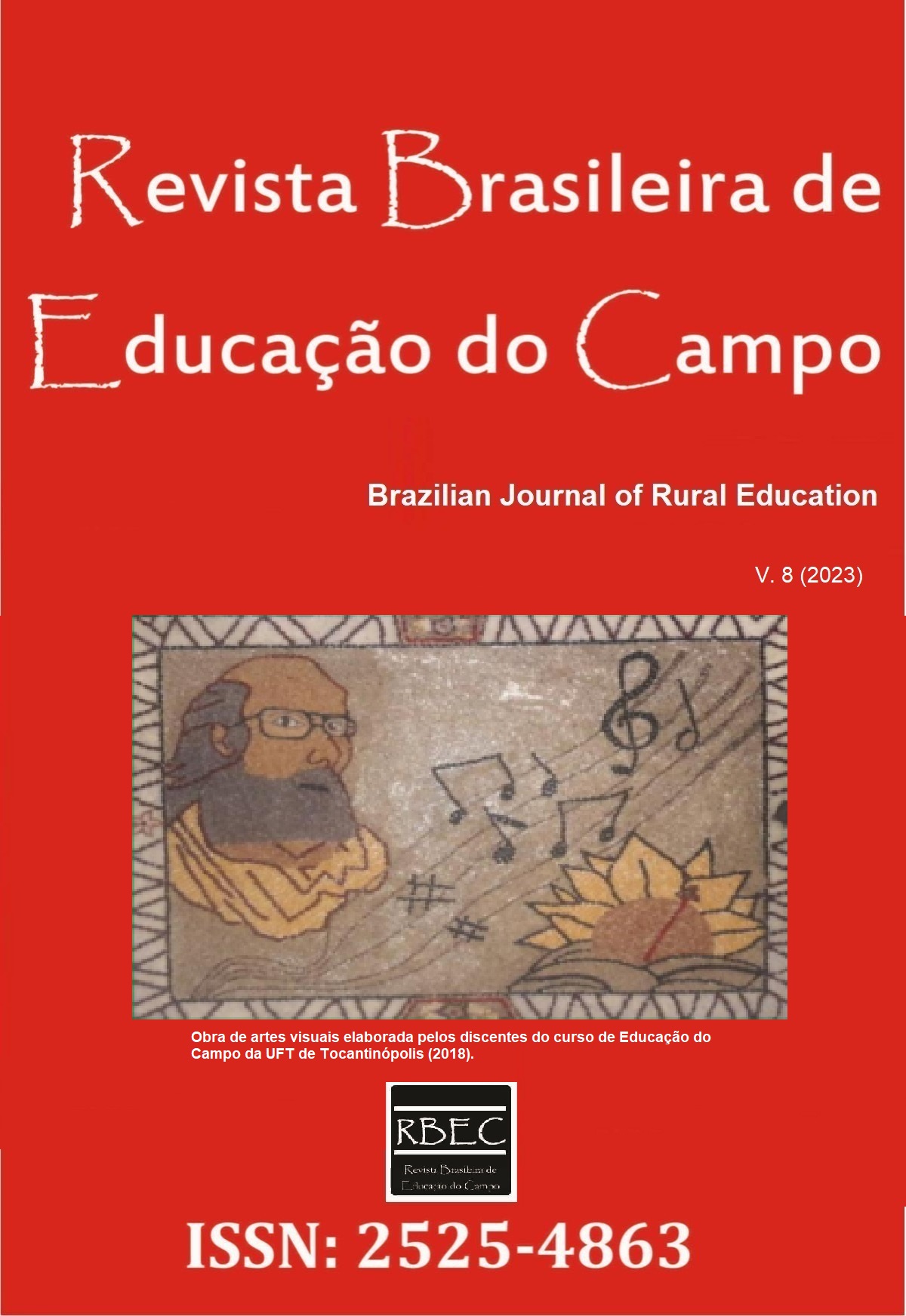Scientific Literacy in Childhood Education: experience in a countryside school in times of pandemic
DOI:
https://doi.org/10.20873/uft.rbec.e14489Abstract
ABSTRACT. The present study analyzed the implementation of a set of activities in Early Childhood Education, based on the methodology of the Islands of Rationality (Fourez, 1997). The qualitative research was carried out remotely in two Pre-School classes in a rural school in the city of São Gabriel/RS, during the year 2020. Different methodological strategies were used, such as drawings, observation of the surroundings of their homes, the local landscape, interviews with family members, listening to the radio, writing poems, and producing models. Data are presented according to three categories: i) Reflections on remote work at Escola do Campo; ii) The IIR methodology in Early Childhood Education and iii) Scientific Literacy in Preschool. Remote work brought some challenges, especially in Early Childhood Education, considering the need for interaction between subjects and teacher mediation. It was found that learning took place in other spaces and times, mainly in the interaction with family members and in the observation of the social and natural environments of their surroundings, being important for the construction of the identity of the subject of the countryside and the appreciation of cultures and knowledge. locations. The use of the IIR methodology in Early Childhood Education is in line with the Experience Fields signaled by the National Curricular Common Base (Brasil, 2017). It is concluded that some skills related to Scientific Literacy, such as autonomy, mastery, and communication can be achieved with the development of an IIR in Preschool, even if remotely.
Downloads
Literaturhinweise
Brasil. (2017). Base nacional comum curricular: educação é a base. Recuperado de: http://www.observatoriodoensinomedio.ufpr.br/wpcontent/uploads/2017/04/BNCC-Documento-Final.pdf
Bernardo, A. (2020, 08 de julho). Da pandemia nasce uma nova relação entre escola e família. [Site Nova Escola]. Recuperado de: https://novaescola.org.br/conteudo/19474/da-pandemia-nasce-uma-nova-relacao-entre-escola-e-familia?gclid=Cj0KCQjwl7qSBhD-ARIsACvV1X0t8gP1tORruLZXE2hZp0ViGugfsFv8AQPgaYpu8n7xQiEkefW9aI4aAr2EEALw_wcB
Bettanin, E., & Alves Filho, J. P. (2003). Alfabetização científica e técnica: um instrumento para observação dos seus atributos. In Anais do IV Encontro Nacional de Pesquisa em Educação em Ciências. Bauru, SP.
Bimbati, A. P. (2020, 01 de julho). Escolas rurais em quarentena: internet via rádio, acesso limitado aos materiais impressos e evasão escolar. [Site Nova Escola]. Recuperado de: https://novaescola.org.br/conteudo/19440/escolas-rurais-em-quarentena-internet-via-radio-acesso-limitado-aos-materiais-impressos-e-evasao-escolar#:~:text=Os%20desafios%20e%20esfor%C3%A7os%20docentes,os%20materiais%20impressos%20na%20escola
Boff, L. (2000a) Ética da vida. Brasília: Letraviva.
Boff, L. (2000b). Ethos Mundial: um consenso mínimo entre os humanos. Brasília: Letraviva.
Boff, L. (2000c). A voz do arco-íris. Brasília: Letraviva.
Fourez, G. (1997). Qu'entendre par "ilot de rationalite"? Et par "îlot interdisciplinaire de rationalité"? Aster, 25, 217-225. Recuperado de: http://ife.ens-lyon.fr/publications/edition-electronique/aster/RA025-10.pdf
Fourez, G. (2005). Alfabetización científica y tecnológica: acerca de las finalidades de la enseñanza de las ciencias. Buenos Aires: Ediciones Colihue.
Gil, A. C. (2002). Como elaborar projetos de pesquisa. São Paulo: Atlas.
Lorenzetti, L., & Delizoicov, D. (2001). Alfabetização científica no contexto das séries iniciais. Ensaio Pesquisa em Educação em Ciências, 3(1), 37-50. DOI: 10.1590/1983-21172001030104.
Louv, R. (2016). A última criança da natureza: resgatando nossas crianças do transtorno do déficit de natureza. São Paulo: Aquariana.
Marques, A. C. T. L., & Marandino, M. (2018). Alfabetização científica, criança e espaços de educação não formal: diálogos possíveis. Educação e Pesquisa, 44. DOI: 10.1590/s1678-4634201712170831. Recuperado de: https://www.revistas.usp.br/ep/article/view/143528
Morin, E., & Kern, A. B. (2002). Terra-Pátria. Porto Alegre: Sulina.
Morin, E. (2003). Ciência com consciência. Rio de Janeiro: Bertrand Brasil.
Morin, E., Ciurana, E-R., & Motta, R. D. (2003). Educar na era planetária: o pensamento complexo como método de aprendizagem pelo erro e incerteza humana. São Paulo: Cortez; Brasília: UNESCO.
Nehring, C. M., Silva, C. C., Trindade, J. A. de O., Pietrocola, M., Leite, R. C. M., & Pinheiro, T. de F. (2000). As ilhas de racionalidade e o saber significativo: o ensino de ciências através de projetos. Revista ENSAIO – Pesquisa em educação em ciências, 2(1), 88-105. DOI: 10.1590/1983-21172000020107.
Neves, J. L. (1996). Pesquisa qualitativa – características, usos e possibilidades. Caderno de Pesquisas em Administração, 1(3), 1-5. Recuperado de: https://www.hugoribeiro.com.br/biblioteca-digital/NEVES-Pesquisa_Qualitativa.pdf
Organização Mundial de Saúde. (2019). Orientações sobre a atividade física, comportamento sedentário e sono para crianças menores de 5 anos. Organização Mundial de Saúde
Parecer CNE/CEB nº 20/2009, de 11 de novembro de 2009 (2009, 11 de novembro). Revisão das Diretrizes Curriculares Nacionais para a Educação Infantil. Recuperado de: http://portal.mec.gov.br/dmdocuments/pceb020_09.pdf
Parecer CNE/CP nº 5/2020, de 28 de abril de 2020 (2020, 28 de abril). Reorganização do Calendário Escolar e da possibilidade de cômputo de atividades não presenciais para fins de cumprimento da carga horária mínima anual, em razão da Pandemia da COVID-19. Recuperado de: http://portal.mec.gov.br/index.php?option=com_docman&view=download&alias=14511-pcp005-20&category_slud=marco-2020-pdf&Itemid=30192
São Gabriel. (2020). Projeto minha Cidade Educadora. Secretaria Municipal de Educação de São Gabriel. São Gabriel, 2020.
Sasseron, L. H., & Carvalho, A. M. P. de. (2008). Almejando a alfabetização científica no ensino fundamental: a proposição e a procura de indicadores do processo. Investigações em Ensino de Ciências, 13(3), 333–352.
Veröffentlicht
Zitationsvorschlag
Ausgabe
Rubrik
Lizenz
Copyright (c) 2023 Lia Heberlê de Almeida, Elenize Rangel Nicoletti, José Vicente Lima Robaína

Dieses Werk steht unter der Lizenz Creative Commons Namensnennung 4.0 International.
Creative Commons Attribution License
Creative Commons Attribution License
Proposal for Copyright Notice Creative Commons
1. Policy Proposal to Open Access Journals
Authors who publish with this journal agree to the following terms:
A. Authors retain copyright and grant the journal right of first publication with the work simultaneously licensed under the Creative Commons Attribution License that allows sharing the work with recognition of its initial publication in this journal.
B. Authors are able to take on additional contracts separately, non-exclusive distribution of the version of the paper published in this journal (ex .: publish in institutional repository or as a book), with an acknowledgment of its initial publication in this journal.
C. Authors are permitted and encouraged to post their work online (eg .: in institutional repositories or on their website) at any point before or during the editorial process, as it can lead to productive exchanges, as well as increase the impact and the citation of published work (See the Effect of Open Access).














